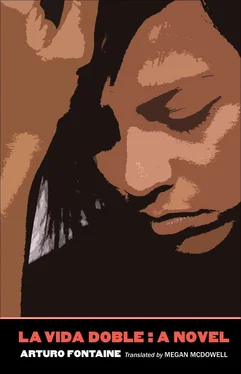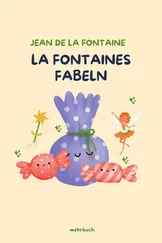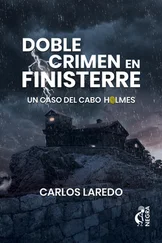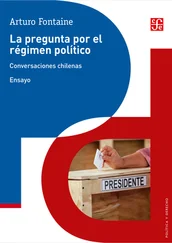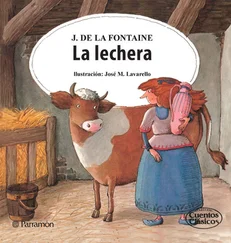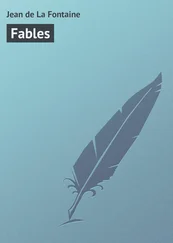An instant, every instant of the present, is a scar made into a window. Here in Stockholm, I still sometimes wish someone would shoot me. It could happen. Maybe they’re looking for me, to kill me. But no, no one is looking for me. I reproach myself. Then I feel an urge to kill someone, some stranger passing by me in the street. So I would matter to someone. If no one is to love me, may someone at least fear me. Frustration, I tell myself, I contradict myself. This lasts.
You don’t understand this Lorena you’re listening to: I drink from the chalice of my own abjection. It’s sweet and bitter, my chalice, like a vice. A long resentment can protect and sustain. It can become a religion. Ha! I want to laugh, but the laughter dries up in my mouth.
I have to leave behind this thing that is freezing me. How? I will, but not yet. I will. Am I doing it already? Suffering has not purified me. I’m a prisoner. I’m a wretch. If only I could drag myself to the wretched door. If I could turn the lock on that door. If I could. If I had the key. I would have had to reach the door. There would have to be a door. But I survived. I became a worm, but I survived. I’m alive. I’ve become shit, I’m dying, but I’m still alive here in Stockholm.
I’ve come only to see him, as a surprise. And as soon as I get to Charles de Gaulle Airport, my spirits rise. I call Giuseppe that same afternoon. I’ve kept his number for years and years, written in my personal code. I don’t dare leave my name on the machine. What if he’s not in Paris? The next day I call again. A sleepy voice that could belong to anyone answers. Suddenly, I recognize my name in his shout. He can’t believe it’s real, he tells me. He’s tried to find me so many times, he tells me. We agree to meet at five in a café.
I got there early so I could see him go in. I waited for him, trembling, on the other side of the street. I recognized him and my heart gave a jump. His hair was completely white, but he still had a thick mane. He walked with resolve, but a little bent over. He sat at a table close to the entrance. I kept watching through the window. In no time, a bottle of white wine and two glasses appeared on the table. He had arrived early.
I decided to stay in the street a while. I was sweating. I remembered his smile as he opened the door to his apartment: Voilà la plus belle! I went into the bathroom of another café nearby, and I spritzed myself with perfume, touched up my makeup, and brushed my hair. I crossed the threshold five minutes late. My heart was in my throat. I stood for a moment with the revolving door behind me. Was I waiting for him to give a shout and run to embrace me? I passed slowly among the tables and I recognized his same cologne as always: Giuseppe, I thought. But I said nothing to him, and I sat down at the end of the bar on a stool. I ordered a whiskey. Then I looked at him: his elegant nose now held up a pair of glasses, and his face was a full net of wrinkles. Giuseppe was still a very attractive man. The glass shook in my hand. I started to feel the same fire as before, l’antica fiamma.
He picked up his glass and took a long sip. He smoothed his hair with his hand. He turned his white head, and his eyes took in the tables. They finally landed on the bar. There were three men and me sitting on the stools. I felt his eyes scanning my body. He lowered them and took another sip of wine. That was it.
As I passed very slowly by his table, I smelled his cologne again.
Sometimes I still ask myself: What if I had stayed a few seconds longer? And if I had spoken to him?
Anita’s devotion to her father lasted some ten months. Then she announced in a letter that she’d gone to live with two friends from the university in an apartment in downtown Santiago. She insinuated in a phone conversation that his wife was too jealous. Now they saw each other every morning because he — the model father — went to pick her up to bring her to the university. And then December came and two days before Christmas, when I opened the door of my apartment, I heard music. I saw a shadow in the hallway and I heard a “Mom?” It was magical. In an instant I went from sadness to utter joy. I’ve never gotten or will get a better Christmas present. Those were wonderful days. We went to the movies, out to eat at our favorite restaurants from before. We went together to H&M to buy a sweater she wanted. She seemed so womanly, so pretty. We found ourselves together in front of the mirror.
“I’m looking gray,” I say, when I see the surprise in her face.
“No,” she tells me. “You are gray.”
The aging process seems to come from outside of me. It’s a disguise, a mask that disfigures me. Youth, on the other hand, sprang from within me. The old, gray-haired woman in the mirror isn’t me. She’s an invader who took over my body. I try to tell Anita something of that.
Anita went out at night with the friends she still has here. But she wanted to be Chilean, she told me. She goes to bed late, when I am already asleep. When I get up every morning I see her closed door. I know she is in there, sleeping. Then slowly, slowly, I run my fingers over her door, caressing the wood, not wanting to wake her.
And, just as she arrived, she left. On the fifteenth of January she took the plane back to Chile. Only then did I realize how little she had told me about herself, about her real life. She was studying business at a new university, a private one that I didn’t know. And her father? Nothing. She never told me anything about him.
Returning: the old woman, the liaison who was waiting for “Viollier” the day they killed him, goes a few days later into a currency exchange in Calle Monjitas. She does it twice in the same month. Pancha, who is following her, has the temerity to follow her in the second time. She watches as they let the old woman into an interior office. She soon comes back out again. She looks tense. Pancha tries to find out which office she went into. It isn’t possible. She goes back to Central to report.
I run into her in the hallway. She keeps walking almost without acknowledging me. Her black shirt that fits her so well. “They called me in,” I say. She shrugs her shoulders. I follow her in. I see Chico Marín, who gives me a forced smile. His lizard eyes. He goes on talking at half volume with Mono Lepe. Only the television makes any noise. Iris goes over and turns it off.
The door to Macha’s office opens and Great Dane appears. He’s wearing a dark suit. His blond hair falls frothy and shining over his shoulders. I’ve never seen him in a tie before. He slowly takes off a pair of Ray-Bans that are just like Macha’s. He looks at us one by one from left to right. No one says a word. When his eyes leave those of Indio Galdámez and fall on mine, they try to get inside me, to tell me, “I know you, kid,” and then they go back. Suddenly, he looks at the ceiling and says: “Macha has been detained. Counterintelligence. I ask — I demand,” he corrects himself, “absolute confidentiality. They’ve opened a case against him. I’m the one in charge of this team now. Until new orders come down. I’m the interim. Any questions?” Silence. “OK then, go on with your work.”
He goes back into the office and closes the door. But he thinks better of it and calls to Pancha. He ushers her in. She throws me a look just before the door closes. We disperse without talking. Macha has fallen, fait accompli. The king is dead, long live the king.
Great Dane orders a tail put on everyone who works in that currency exchange. They take photos of people going in and out. They don’t get much. Great Dane sends in two fake technicians from the phone company: Mono Lepe and Indio Galdámez. They go into the inner offices. They see an old woman come out of the manager’s office. They report to Great Dane. He orders them to go in and check the lines. They’re not allowed in. They wait. When they’re finally let in no one is there. Seems like someone escaped, right? They report. Outside, agents are waiting to take a photo. No one shows.
Читать дальше
